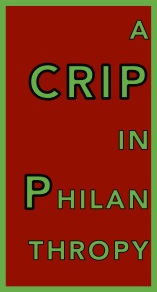vulnerability
My Speech to the Graduates, or What I Wish I’d Known As a 5 Year-Old Crip

Ingrid Tischer on the day of her kindergarten graduation in Greece, New York, circa 1970. She is wearing a rainbow vest and skirt sewn by her mom. Note the clutching of the diploma and school-bestowed book-bag, and anxious expression — all indicate a future in literary fiction writing and nonprofit fundraising.
If the grand success of the 20th century was the rise of disability as an accepted political identity, we intend for the 21st century to be the time when disability is recognized as the constant but hidden variable in nearly all formulas for global human rights. Including disability as a given factor in most people’s lives is essential to successfully advancing the rights of people who are members of minority communities, survivors of violence and/conflict zones, and veterans; people who live with chronic ailments and have survived catastrophic illness, people who are young and old; male, female, and anywhere on the gender spectrum. While disability has been understood as “different and divided” I believe it can come to be seen as “unique and united.”
As you sit sweating under an increasingly sweltering sun this day, feeling the inevitable effects of a wasteful attitude toward natural resources, you may not be thinking of another type of catastrophic loss caused by another type of massive denial. I speak of almost no one’s favorite topic: Disability. How denying disability’s central role in just about every human life relegates significant chunks of our lives — and worse still, people-sized chunks — to the rubbish heap. It may be that “disabled” doesn’t feel like a word that fits who you are. Fine. Have you ever felt vulnerable? Think of “vulnerable” as a gateway word to a chronic case of disability-speak.
